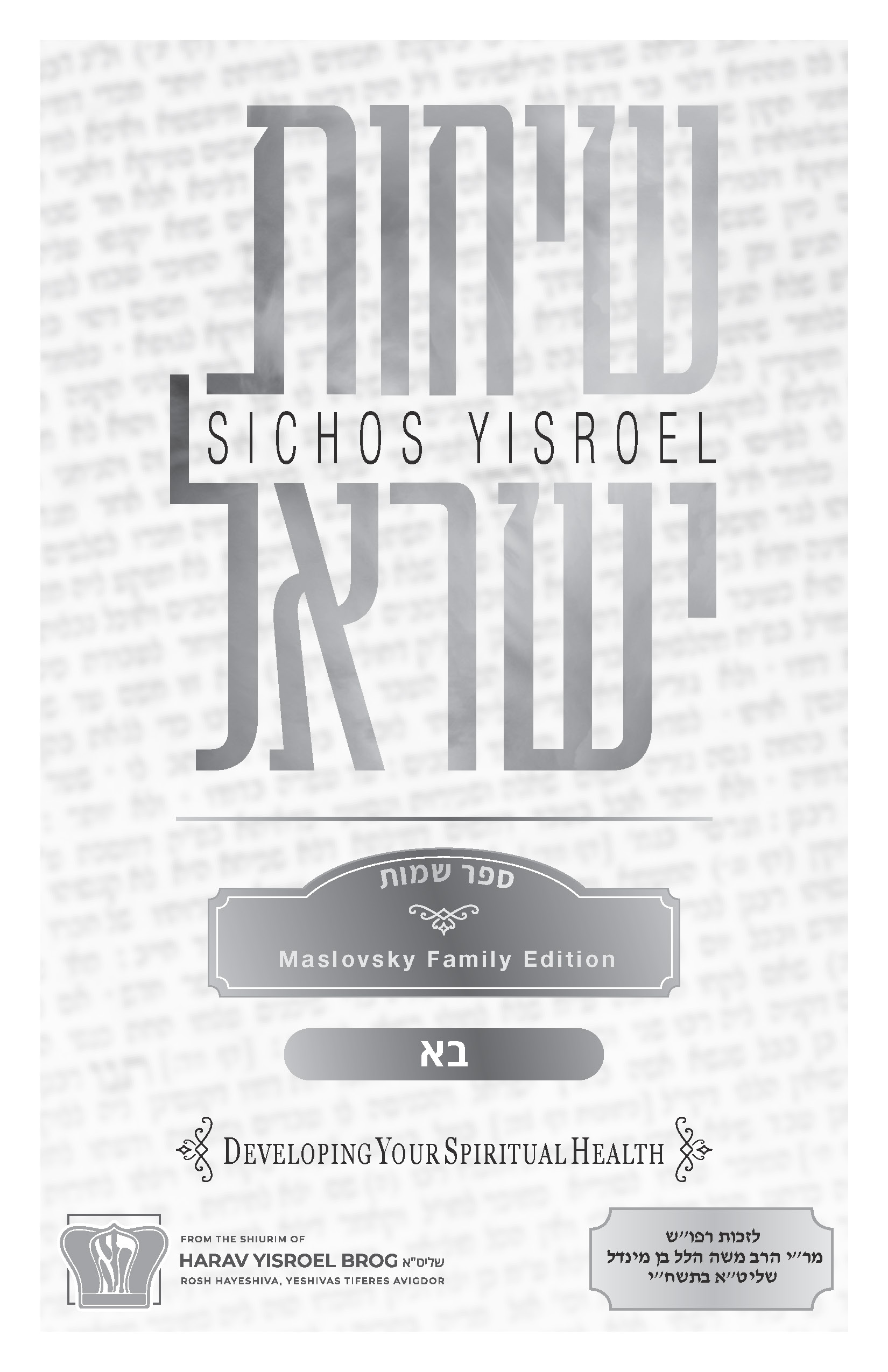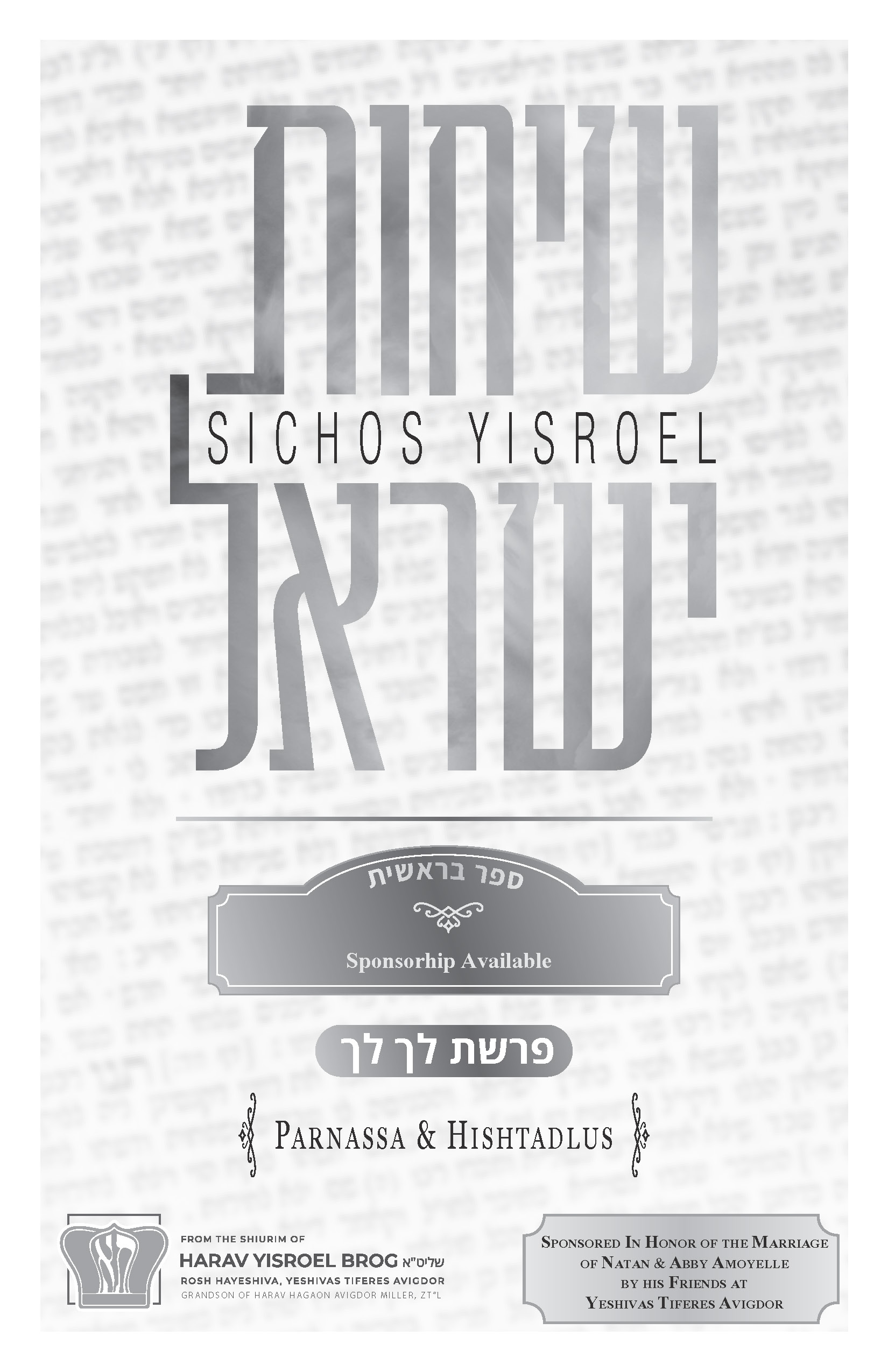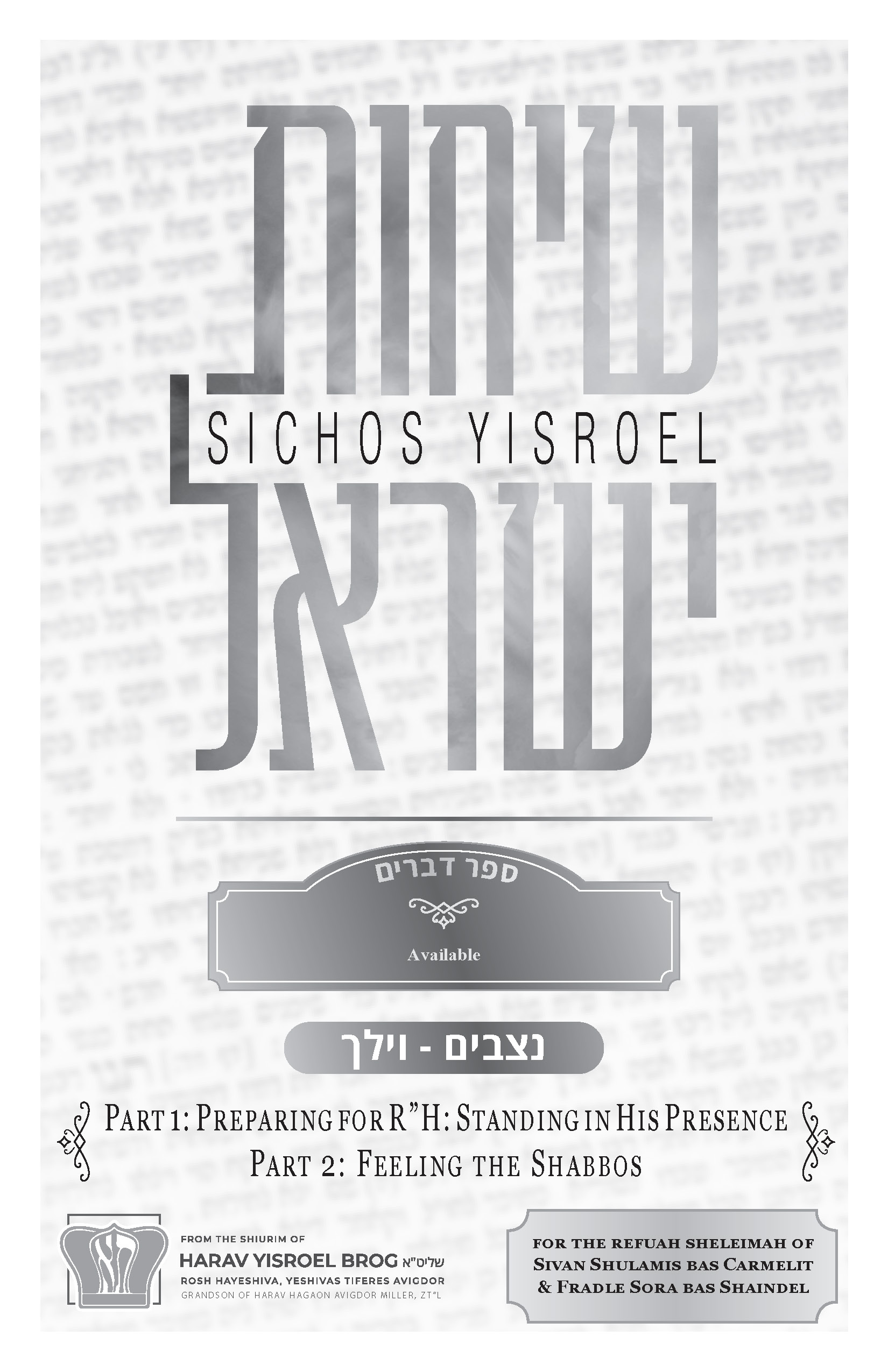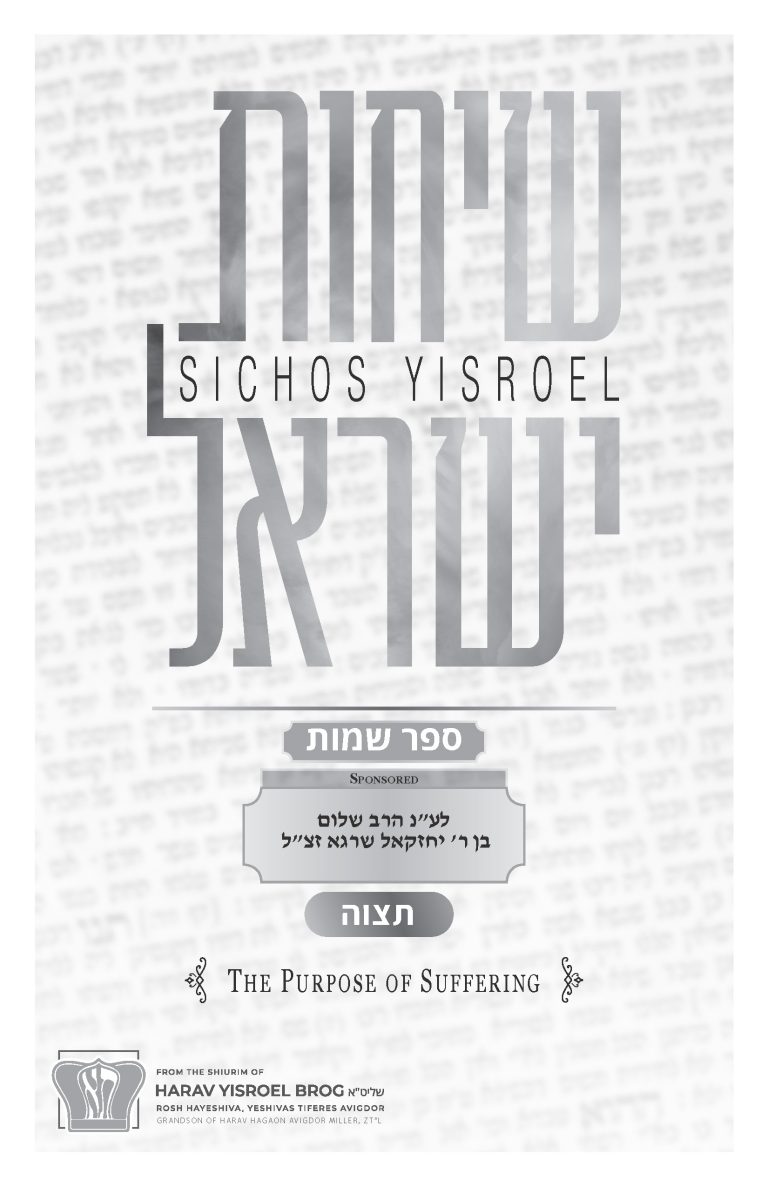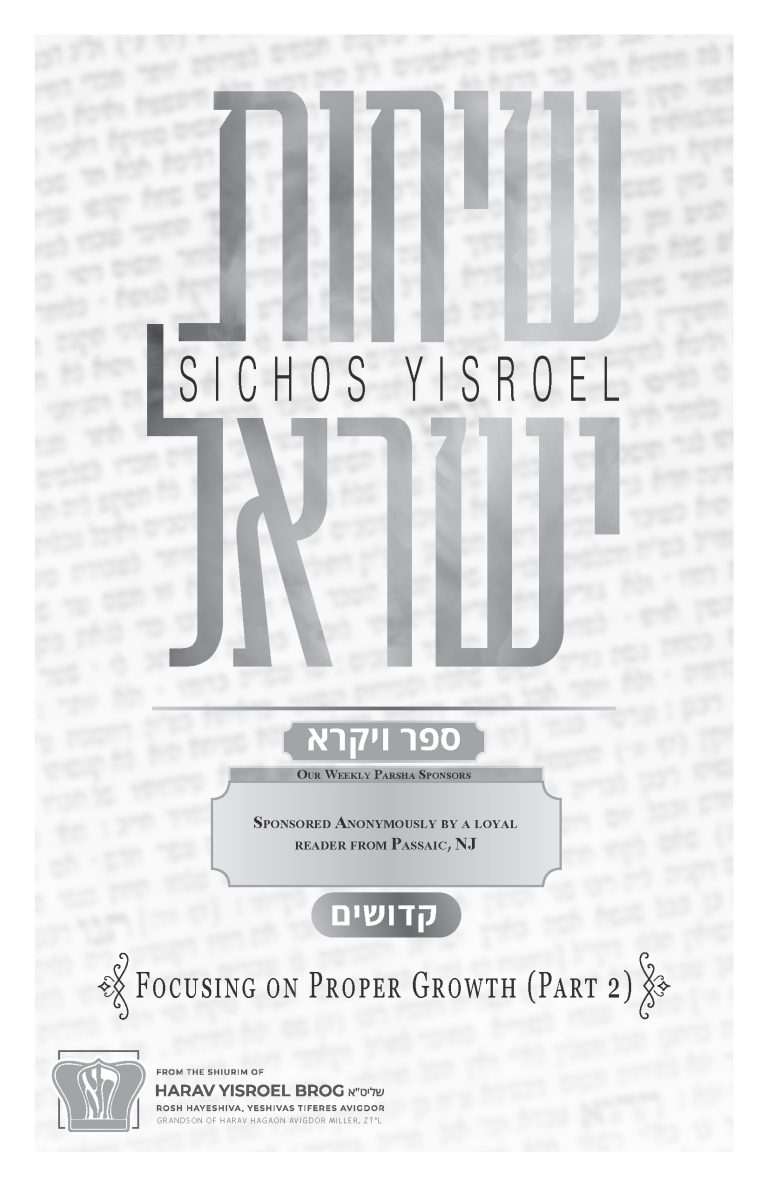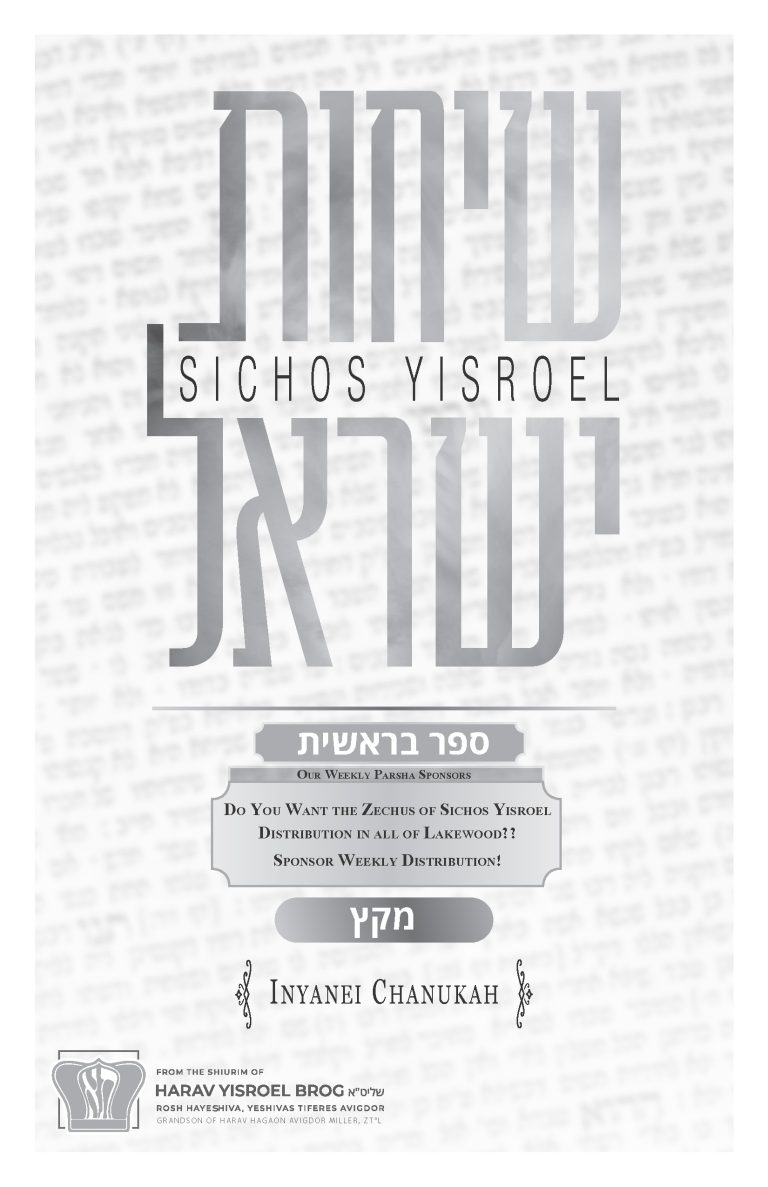Bo 5783: Developing Your Spiritual Health
Sponsored
לזכות רפו”ש מר”י הרב משה הלל בן מינדל שליט”א בתשח”
Consider sponsoring a shiur
Visit YTATorah.org
Shiur presented in 5778
Pharaoh’s Unhealthy Heart
In the gemara (Bava Kamma 92) there is a gantze sugya about the source for certain sayings that the world says. Mei heicha teisi you have to find a mekor in Torah for sayings that people say? הפך בה והפך בה דכולה בה – turn it over and over, for all is therein (Avos 5:22). So in the medical field, we find a concept of American Heart Awareness Month or American Heart Day. The medical field sends out information and knowledge about the heart and the importance of maintaining the health of our hearts; what things contribute to the health of the heart; what things detract from the health of the heart. Where’s the mekor for that? We want to say that Parshas Bo is the mekor for Heart Health Week. At the beginning of the parshah it says, כי אני הכבדתי את לבו – for I have hardened his heart (Shemos 10:1). There was an individual who had a serious heart sickness. Who had this unhealthy heart? Pharaoh. כי אני הכבדתי את לבו.
There are many diseases. What’s the famous disease of the heart? Hardening of the arteries, or atherosclerosis, where the arteries become clogged and they don’t function. If you take a look in the medrash (Shemos Rabbah 13:3) it says as follows: מהו הכבדתי, what does the term הכבדתי mean? Zugt Chazal:שעשה הקב”ה את לבו ככבד, Hashem made his heart like liver. Hashem turned his heart into a liver. Chazal asked, “In what way did it become liver?” It says when a liver is cooked it takes on a certain hardness, in a different way than other cuts of meat. Liver by nature is very pliable like all meat is. Meat is soft. A lot of cuts of meat actually start off being harder than liver. But when you subject liver to fire, you know what happens? It does not simply become cooked. When the cooking process enters the liver, it takes on a whole new condition. A whole new hardness sets in. It changes its nature. כך נעשה לבו של פרעה, the heart of Pharaoh became ככבד הזה, it became like this hardened liver. What was the result of that? It became stuffed ולא היה מקבל דבריו של הקב”ה, the heart could not absorb the words of Hakadosh Baruch Hu.[i]
When we read this Chazal, whatdo we say? I see not only that Hashem had a sense of humor – like it says the beginning of the parshah אשר התעללתי במצרים – I made a mockery of the Egyptians (ibid. 10:2) and like it says יושב בשמים ישחק – The One Who dwells in Heaven laughs (Tehillim 2:4), but even Chazal had a sense of humor! They turned the ‘hearts’ into ‘cooked livers.’ It’s a mashal, of course. But it makes us ask, what’s going on over here?
The Real Function Of The Heart
The reason why we have such difficulty with this question is because we lack basic understanding of Chazal and what reality is. The nature of a human being is that he views everything superficially. We only see chitzoniyus. We don’t see penimiyus. A person has to know that our chachamim viewed everything from the inside and didn’t look at the outside bechlal. The opposite of us. All of their words were to explain and reveal the inner dynamics and mechanics of things. Chazal taught us here by means of a mashal.You know when you need a mashal? Most people don’t understand the concept of meshalim. Many times Chazal say משל למה הדבר דומה. Most of us don’t get it. We think of saying, “I understood you the first time you said it. Why are you telling me a mashal?” A mashal is used when someone wants to bring out an inner concept that’s not readily seen, but via a mashal which people can grasp and understand, then you could understand what he is trying to get across. Chazal saw the inside of everything in its true depth and form so they needed to use meshalim to give over the deeper concepts.
I used to learn with a big cardiologist. I hadinteractions on a personal level with some very famous cardiologists. It’s amazing how whenever they look at a person, they’re not impressed by the outside. I had one cardiologist who saw people only in terms of their hearts. He used to point out to me, “You are a walking so and so” – I forgot the exact terminology he used, but his intention was, “you are an accident about to happen.” You have every sibah and siman. He could tell me what my heart looks like without an EKG.
I remember one time I finally said to him, “You know what? I’m going to go for an EKG. I’m going to go for a workup.” He said, “Rabbi, I want you to go for a full workup in the clinic with me.” I did. After that appointment, he called my wife and told her, “Prepare the family for open heart surgery.” My wife said, “What? Already?” He said, “There’s a 98% chance your husband is going to be in surgery by this evening. By tomorrow the latest.” I didn’t know about this phone call, baruch Hashem,or I would have popped him.
The first thing they do, is they give you a general workup. They said, “Now we’re going in for the stress test.” A stress test is like a non-modern treadmill. They have signs on the wall, “If you feel you’re having a heart attack, say something. How stressed are you feeling?” There are pictures of faces of pain, of effort, on the wall. I tell one of the guys standing there, “I go on a treadmill almost every day. This is not going to impress me.” He says, “That’s what you think.” That guy didn’t belong there because he doesn’t give stress tests, but he was sure he was going to give me the good news on the spot. So he had me on the machine. All of a sudden, he tells them, “Turn it up now.” He says, “How’s it going?” I said, “So far so good.” “Turn it up now.” It’s at an incline. “Turn it up now.” I saw the guy’s face. I’m watching his face. The doctor said, “Just turn it up.” Finally, one of the nurses there spoke up, “I think it’s enough.” The doctor said, “I would just leave him a little longer.” The guy was so disappointed. When you get off, you lie in a bed, and they hook you up with all kinds of things, and they take all kinds of pictures, hundreds of pictures of your heart and your functions. I said to the nurse, “How did I do?” She said, “You did as good as the doctor did.” This doctor was like macho man USA. He would go on a rowing machine every day for 45 minutes. He was into cardio stuff like crazy. I said, “No, seriously.” She said, “You did exactly what he does.” I said, “I know one disappointed man today.”
I came home. My wife told me, “How’s everything?” I said, “Baruch Hashem.” She says, “When is the operation scheduled for?” I said, “What do you mean?” She said, “You have an operation.” I said, “Who told you that?” I said, “The doctor called you?” I called him on the phone. I gave it to him over the head. I said, “What kind of chutzpah is this?” He said, “You had every siman.”They just look at the penimiyus. The guy’s eyes weren’t so good, baruch Hashem.
You have to understand that Chazal saw everything, and they saw the inside of a mentsch correctly. People don’t understand. Let’s say we watch the behavior of a person, and we see that one minute he is acting like a child, one minute he’s acting like an adult, one minute he’s acting up, the next minute he’s acting down. So we say, “What is this?” We say, “That’s how people are. People don’t usually do the same thing every single time.”
But you have to know that it’s nisht azoi. When Chazal saw a person’s behavior that seemed to lack stability, they always teitched it up. When they studied Pharaoh, they made an extreme analysis of Pharaoh’s behavior. Hashem subjected Pharaoh to a stress test, a serious stress test. First, three weeks of warning. Then came the blood and the fish. Then the tzefardaya and the kinim. Chazal came and said, “You know what the problem is? This guy has got a heart. But he is so far gone on his stress test, that his heart is not a heart anymore. His heart became a kaved. It became liver.”
Now, if you go to heart tests, they look for how many arteries are clogged. There’s quadruple bypass, two arteries, one artery, 90%, 100%, 70%. All kinds of Torahs over there. Pharaoh’s heart was completely clogged. It’s not pshat that he wasn’t a smart person. It’s not pshat that Pharaoh was a hillbilly or a redneck. Pharaoh was a very smart man. But his problem was, Chazal tell us, he had a very sick heart. And when a person has a sick heart, that is how they behave.
Chazal ask, what are the functions of a heart? How many functions does a heart have? It’s amazing. Shlomo Hamelech says דברתי אני עם ליבי, I spoke with my heart (Koheles 1:16).[ii] He had a conversation with his heart! Chazal tell us, הלב רואה, the heart perceives (Koheles Rabbah).[iii] It says וליבי ראה הרבה חכמה – my heart sees a lot of wisdom (ibid.). The heart hears. Shlomo Hamelech asked Hashem ונתת לעבדך לב שומע. The heart talks. It says ודברתי אני עם ליבי. Chazal go on to explain that there are 58 different functions of the heart (ibid). This is mind boggling. This is such an eye-opening concept. If you ask somebody, “Shemiyah relates to what?” They say, “Your ozen.” Re’iyah is einayim. But Chazal tell us that a person’s ability to see, is dependent on his healthy heart.
I once took a rosh yeshivah, a big talmid chacham, from Yerushalayim to the Cleveland Clinic. He needed a meturgaman (translator),and I was the go between. He came for a heart test. They shut the lights off, and they tell me to tell the rosh yeshivah to open his eyes wide. The doctor sticks this powerful light directly in the rosh yeshivah’s eye and he’s studying the eye. I said, “I thought we were here for the heart. Is this the optometry department? What are you looking at his eyes for?” He says, “From the eyes, you can tell the health of a heart.” I said, “Do you know where that piece of wisdom comes from?” He was a Jewish fellow. I said, “It comes from the Chazal. Our sages said long ago, הלב רואה, the heart sees.” There are other gemaros referring to that also.
People don’t begin to understand how the heart is a key. The heart feels. The heart has pain. The heart loves. The heart hates. The heart is afraid. The heart makes people tough. The heart lets a person humble himself. The heart is full of pride. The heart desires. So many different functions of the heart, it’s unbelievable! To have a healthy heart is not stam. In davening we say וכל הלבבות יראוך, all hearts shall fear You. “Fear You,” means “Be aware of You, grasp You, and therefore have awe of You.” You know what a lev is? A lev is something which is yarei, it feels fear. Someone who isn’t yarei, you know why that is? His lev is not healthy. If someone is able to perceive Hashem, if he’s a yarei, that’s an indication of a healthy heart. If he’s not yarei, it’s not the pshat that he’s stam lacking fear and needs some mussar. No, no. It’s a kilkul (corruption, ruin). There’s a mess up in that individual’s heart. The person doesn’t have a healthy lev.
A Nice Strong Heart or Timtum Halev
It says in the passuk:ושומע תוכחת קונה לב – and he who heeds rebuke gains a heart [i.e. understanding] (Mishlei 15:32). You hear what this passuk in Mishlei says? It says, a person who listens to tochachah – he listens to people, he’s open to hearing corrections in his behavior, he’s willing to be shomea things that he needs to change in his life – ושומע תוכחות קונה לב. It doesn’t say he gets good hearing. It says your heart becomes healthier. Beforehand, when you couldn’t hear tochachah, your heart was messed up because the nature of a lev is that it hears. And when you hear and listen and you accept and you’re mekabel what they’re telling you, you know what happens? You get a healthier heart. People think, “My problem is my stomach. My problem is I’m manic. My problem is I’m bipolar. My problem is I’m immature.” You know why a child acts like a child? Because his heart is not yet developed. Everything is in the heart.
And this is how a person has to view himself now, in a whole new fashion. Take a look at human beings, let’s look at ourselves, look at how we behave throughout a day. From minute to minute, we could be totally different human beings. One minute we’re acting serious, one minute we’re acting foolish. One minute we’re acting responsible, one minute we’re acting irresponsible. One minute we’re talking like a mentsch, the next minute we’re talking not like a mentsch. Our behavior changes. One minute you’re learning, one minute you’re trembling, one minute you’re sleeping. A person can be all over the place! You know what we think it is? We think that we don’t chap what is going on in our lives. Somehow we don’t feel ‘with it’. I’m not really feeling it. If I felt it then it would be a different matzav. But that is not the case. Rav Yerucham says, do you know why a person changes his mind every second? You have to know the reason is because your heart is very shvach. If a person sees that he’s not stable and he can’t behave stably, he doesn’t know how to act in a normal manner, it’s an indication that his lev is mekulkal, that’s all. All of his machshavos, all of a person’s understanding, all of a person’s reactions, are indications of his heart. If you ever see a guy walk up steps and he’s breathing heavily and you ask him, “Why are you breathing so hard?” So the guy says, “Oh, it’s my feet.” What do the feet have to do with breathing? We understand what it really is. It’s his heart. Obviously, if the guy is huffing and puffing when he goes up three stairs, that’s an indication that something’s wrong with his heart. If your feet hurt you, you don’t huff and puff. There are many pains that a person has, that are indications of a physically sick heart.
When a person doesn’t feel good, he lies down. He turns this way. Then he turns that way. Behavioral changes means one moment I’m happy, one moment I’m down. These are all changes in the behavior. You know where that comes from? It’s because your heart is messed up. That’s what you have to know.
When the Torah tells us what Hashem did to Pharaoh, that Hashem played with Pharaoh’s heart and turned it into a kaved, it is teaching us this concept. He had an unhealthy heart, so he could not be mekabel the words of Hakadosh Baruch Hu. When a person’s heart turns into liver, it doesn’t function anymore and it’s devarim peshutim that you have no control over yourself.
The Ultimate Healthy Heart: Being Aware of Hashem
Now, the emes is that every morning we daven.Do you know what tefilah is called? Avodah shebelev. It says ולעבדו בכל לבבכם. You’re supposed to serve Hashem with all your heart. The gemara (Taanis 2a) says: איזו היא עבודה שהיא בלב. You know what it says? הוי אומר – זו תפלה. Avodah shebelev is tefilah. Towards the end of davening we say a short tefilah. We say ה’ אלקי אברהם יצחק וישראל אבותינו שמרה זאת לעולם, please Hashem, be shomer thisfeeling. This healthy heart we have now, be shomer it leolam preserve it in us eternallyליצר מחשבות לבב עמך, in the face of the yetzer hara that challenges and pounds our heart all day long and tries to weaken us, והכין לבבם אליך – and ‘prepare’ their hearts towards You (Divrei HaYomin 1; 21:18).[iv] You know when this tefilah was said? When the Beis Hamikdash was still standing and the Yidden’s hearts were very healthy, Hashem was mekayem ושכנתי בתוכם in everyone’s hearts who found place for Hashem.
If you look in the Navi at the end of Sefer Melachim (8:57)it says: יהי ה’ אלקנו עמנו, Hashem should be with us, כאשר היה עם אבותינו אל יעזבנו ואל יטשנו, don’t forsake us and don’t leave us. להטות לבבנו אליו. The purpose of our tefilah is to acquire a netiyah in our lev toward Hashem. We should hear Hashem, see Hashem, understand Hashem, feel Hashem, grasp Hashem. That is what we’re trying to do, to acquire a netiyah of the lev toward Hashem.
Shlomo Hamelech, חכם מכל אדם – requested of Hashem ונתת לעבדך לב שומע – grant your servant an understanding heart (Melachim 3:9). Hashem said to Shlomo Hamelech when he was young, “What would you like? Choose! Your wish is my command.” Shlomo didn’t say, “Make me rich.” He said, “Give me, לב שומע.” Hashem said, “You asked for לב שומע – you’re going to get everything.”
Now, it says in the passuk in Melachim (11:4)as follows: ויהי לעת זקנת שלמה, and it was at the end of Shlomo’s life, נשיו, his wives, הטו את לבבו, they twisted, tilted his heart. ולא היה לבבו שלם עם ה’ אלקיו, his heart wasn’t as perfect with Hashem anymore, כלבב דוד אביו. It doesn’t say in the passuk he wasn’t as frum as his father. It says he didn’t have a heart as healthy as his father’s. His father had a healthier heart.
Now, we don’t understand what kind of heart Shlomo Hamelech had. His kind of heart would be a dugma of the healthiest of all hearts! And when you say his heart was a drop הטה, a drop not healthy, we have no concept of what that means. But we know one thing. The gemara in Shabbos (56b)says, whoever says Shlomo Hamelech sinned אינו אלא טועה.[v] All it says is that his heart wasn’t as shalem as his father’s heart. The gemara says, it doesn’t say he sinned. It doesn’t say he did a chet. So what did he do that was not right? The gemara says he should have protested against the behavior of his wives, and he didn’t.[vi] So Hakadosh Baruch Hu considered that lack of protest as a sign that in his lev there was something imperfection. Not like the lev of his father.
A person has to know that the Torah gives us a mitzvah. You know what the mitzvah is? It says in the passuk ומלתם את ערלת לבבכם – and you shall circumcise the orlah of your hearts (Devarim 10:16). You’re supposed to circumcise ערלת לבבכם. In order to set yourself straight, you’ve got to worry about ערלת הלב. What does the passuk say? עבירה מטמטמת לבו של אדם, doing an aveirah is metamtem the lev of a mentsch (Yoma 39a). You know why? Because when a person does an aveirah, it is something more than a healthy lev not being there, there is the addition of orlas halev. Everything is the heart. What makes changes in a person? It is being in possession of a healthy heart. ומל ה’ אלקיך את לבבך ואת לבב זרעך, Hashem is going to circumcise your heart. Everything, all bad middos, the Ramban says, is found in the orlah of the heart. What does the orlah of the lev look like? Does it look like a piece of skin, foreskin around the heart? You know what the orlah of the lev looks like? The Ramban (Devarim 30:6) says: חמדה ותאוה ערלה ללב. And you want to know what circumcising the lev means? שלא יחמוד ושלא יתאוה – “a person should not covet and should not go after his lusts.” A person should go back to the way Hashem made him and Hashem intended him to be. That’s the result of a healthy heart.[vii]
When it says וידעת היום והשבת את לבבך it showseverything is the heart. We say in Krias Shema ושמתם את דברי אלה על לבבכם, והיו הדברים האלה על לבבך. Torah has to get into your heart. Your heart has to hear Torah. You have to put the knowledge of Hashem into your heart. You want to feel Hashem, not that it should be something in your brain cells. The difference between somebody who’s healthy and somebody who is not healthy is not in his knowledge. The unhealthy person is also fully aware of the knowledge. וידעת היום means that anybody could have knowledge. The nafka mina is in the והשב אל לבבך – when you bring it into your heart and feel it. And when a person doesn’t feel it, that has to scare him or her.
I noticed a very interesting thing over the years. There are many people who I’ve spoken to, and they said to me, “You’re right. I don’t feel it. I don’t get it. It doesn’t do anything for me.” I know people who didn’t daven. I asked, “Why don’t you daven?” “It doesn’t resonate with me. I don’t feel it.” “Why aren’t you learning gemara?” “It doesn’t do anything for me.” And I tell the person what the problem is. I’ve told it to many people because I’ve heard many people say the same thing over, bachurim, adults.
People actually believe that ruchniyus becomes a jail. A yeshivah, learning Torah, becomes community service, where you’re forced by the government to provide services for the community against your will. People don’t realize that Yiddishkeitis exercise. It’s pursuing health. When you go to the doctor and he says, “Son, your heart is shot. All of your arteries are shot. You’re about to have a stroke or a heart attack.” Does anybody say to the doctor, “Okay, I guess that’s how it’s going to be. Let me go home now.” You know what everybody who has any degree of sanity says? “What do I need to do?” “You’ve got to change your life. You’ve got to change your lifestyle, your diet, your exercise. You may need surgery. There have to be some major changes in your life.” You know why a person accepts that? Because he wants to live.
When someonesays, “Davening doesn’t do it for me,” he should realize how sick he is and how his heart is so azoi fashtupt that he can’t communicate with Hashem – דברים העומדים ברומו של עולם (Brochos 6b),[viii] the opportunity to talk, to converse with the A-mighty boss, the boss of all bosses who controls every single thing in a person’s life. So instead of saying, “I don’t feel it,” he should go crazy and say, “I’ve got to talk to Hashem.”
You know what a guy who can’t learn anymore says? “I guess I’m not cut out for it. Goodbye.” He closes the gemara. He never opens it again. I know a guy who left yeshivah and he had notes, sefarim, kisvei yad. Unbelievable. I was very impressed. Someone showed me, “These are my son’s kesavim.” I said, “What?!” I open them up, “It’s beautiful!” Mesechtos, not stam klor, shvere sugyos one after another, mesudar. I called the guy up. “This is unbelievable.” He said, “Ah, get rid of it. Get rid of it.” I said, “Maybe your sons should see it. You don’t want your children to see it?!” “Ah, get rid of it.” Because you know why? He was afraid that if he’d look at it or have it in his house it might remind him of how sick he became, what kind of illness he contracted, and he didn’t want to hear that. “I’m not sick. I’m very healthy. I’m just not cut out for yeshivah. I’m not cut out for learning. I’m not a bad person. I can do whatever I want without learning Torah.” No you can’t. It’s an indication of sickness.
A Jew Is Built For Torah – Get Connected
והכן לבבם אליך, a person has to know that if you don’t get on an exercise regimen, if you don’t make major changes in your life, your heart’s not going to get better. If my breathing becomes a little ragged, I get very nervous. If I was struggling with my breathing, I would run to the doctor that minute, if I could. I want to do testing and know what I have to change because my breathing is very important to me. Let’s say the doctor would tell me tomorrow, “You’re allergic to food. If you eat food, you’re going to die.” I’d be ois mentsch. I wouldn’t say, “Oh baruch Hashem I guess I’m not cut out for eating food. What a break. At least I’ll lose weight.” You ask the doctor, “How do I have to live now?” He says, “You’ve got to live now on infusion. No food through your mouth. From now on we’re going to hook you up to something and whenever you need food, we’re going to just connect it to the bag. A nurse will come to your house every two days and change it. It will give you all the vitamins and all the protein you need.” Do you think anybody would say, “Ah baruch Hashem,I’ll save a lot of money that way! No food or restaurants to worry about! No steaks to worry about it. No cholesterol to worry about.” I don’t think anybody would see that as a dream.
When I guys says: “I can’t learn anymore, it doesn’t do anything for me. I can’t daven anymore,” the problem is he has a very sick heart. He doesn’t realize it. A person has to know that you have to start to do exercise and maintain your heart’s health. It’s not automatic. When you start to feel a heaviness coming on, one thing you know עבירה מטמטמת לבו של אדם. It’s got to be like that. A Jew is built for Torah. A Jew is a machine built for mitzvos.
If a guy has a computer that doesn’t operate anymore as a computer, but he’s able to draw pictures on it, is that a computer? There’s something wrong with the hardware. Something on the inside of this machine is not working properly. I tell everybody, “Every Jew is built to learn Torah.” Jew has a mitzvah of והגית בו יומם ולילה – and you should speak in them day and night (Yehoshua 1:8). That’s what a healthy Jew is able to do. “Everybody is able to daven three times a day. Everybody is able to be mekayem all the mitzvos of Hashem if you’re Jewish.” So what stops you? A sick heart. עבירה מטמטמת לבו של אדם. That’s why the first thing you should do is get connected. Become aware of Hashem, השבת אל לבבך.
When the gemara says העמידם על אחת, it means that emunah and bitachon is what the whole Torah is predicated on. All of your power, your healthy heart starts with emunah and bitachon.
When a person does not want to be aware of Hashem, it stands to reason that the guy is shakuah in sin. People think it’s a joke that it’s מטמטמת לבו של אדם. It’s not. And that’s what a person has to work on.
When we read about Pharaoh’s heart sickness and we see how a person could be subjected to such awful things, we’d like to think that Pharaoh couldn’t do teshuvah because Hashem was monea from him the teshuvah. It’s not correct. It says הכבדתי את לבו – I gave him a sick heart. I gave him spiritual artery sclerosis. I hardened his arteries. And if you have hard arteries, it behooves you to wake up and change it. I’ve seen many people who had physically sick heart conditions and they made life changes to diet, to exercise. And then I met them a while later, and asked them how they were feeling. They said, “I never felt better.” I asked, “Don’t you miss all the good times in your life?” “No. I feel healthier than I felt in 20 or 30 years. I feel stronger. I sleep better. I’m enjoying life. The quality of my life is better. I appreciate my life much more now.”
That’s what וידעת היום והשבת אל לבבך does. And in Heart Healthy Week, that’s the place we have to reach. Hakadosh Baruch Hu should help us. Every time we daven, know you’re working out your heart and you should think, “Could I be mechaven for more than one word?” If not, that means there is no heart beating in there. Could you be mechaven for a few words? Maybe you have a little blood stream still getting through bedochek. A lot of people daven and they’re not even aware of the presence of Hashem. They’re totally not aware of it! They don’t know there’s Hashem in the world! That has to scare you. It has to frighten you but also motivate you. That’s how Hashem gives us indicators. Change your life. Daven to Hashem: “Hashem I want to circumcise my heart. I want to get rid of the bad stuff, the chemdah, the ta’avah, the yetzer haras.” והכן לבבם אליך.
[i] דבר אחר, כי אני הכבדתי את לבו, אמר רבי יוחנן מכאן פתחון פה למינין לומר לא היתה ממנו שיעשה תשובה, שנאמר: כי אני הכבדתי את לבו. אמר לו רבי שמעון בן לקיש יסתם פיהם של מינים, אלא (משלי ג, לד): אם ללצים הוא יליץ, שהקדוש ברוך הוא מתרה בו באדם פעם ראשונה שניה ושלישית ואינו חוזר בו, והוא נועל לבו מן התשובה כדי לפרע ממנו מה שחטא. אף כך פרעה הרשע, כיון ששגר הקדוש ברוך הוא חמש פעמים ולא השגיח על דבריו, אמר לו הקדוש ברוך הוא אתה הקשית ערפך והכבדת את לבך, הריני מוסיף לך טמאה על טמאתך, הוי: כי אני הכבדתי את לבו. מהו הכבדתי, שעשה הקדוש ברוך הוא את לבו ככבד הזה שהיא מתבשלת שניה וארטסיס נכנס בתוכה, כך נעשה לבו של פרעה ככבד הזה ולא היה מקבל דבריו של הקדוש ברוך הוא, הוי: כי אני הכבדתי את לבו וגו’:
[ii] דברתי אני עם לבי לאמר אני הנה הגדלתי והוספתי חכמה על כל אשר היה לפני על ירושלם ולבי ראה הרבה חכמה ודעת
[iii] דִּבַּרְתִּי אֲנִי עִם לִבִּי, הַלֵּב רוֹאֶה, שֶׁנֶּאֱמַר: וְלִבִּי רָאָה הַרְבֵּה. הַלֵּב שׁוֹמֵעַ, שֶׁנֶּאֱמַר (מלכים א ג, ט): וְנָתַתָּ לְעַבְדְּךָ לֵב שֹׁמֵעַ. הַלֵּב מְדַבֵּר, שֶׁנֶּאֱמַר: דִּבַּרְתִּי אֲנִי עִם לִבִּי. הַלֵּב הוֹלֵךְ, שֶׁנֶּאֱמַר (מלכים ב ה, כו): לֹא לִבִּי הָלַךְ. הַלֵּב נוֹפֵל, שֶׁנֶּאֱמַר (שמואל א יז, לב): אַל יִפֹּל לֵב אָדָם עָלָיו. הַלֵּב עוֹמֵד, שֶׁנֶּאֱמַר (יחזקאל כב, יד): הֲיַעֲמֹד לִבֵּךְ. הַלֵּב שָׂמֵחַ, שֶׁנֶּאֱמַר (תהלים טז, ט): לָכֵן שָׂמַח לִבִּי וַיָּגֶל כְּבוֹדִי. הַלֵּב צוֹעֵק, שֶׁנֶּאֱמַר (איכה ב, יח): צָעַק לִבָּם אֶל ה’. הַלֵּב מִתְנַחֵם, שֶׁנֶּאֱמַר (ישעיה מ, ב): דַּבְּרוּ עַל לֵב יְרוּשָׁלָיִם. הַלֵּב מִצְטָעֵר, שֶׁנֶּאֱמַר (דברים טו, י): וְלֹא יֵרַע לְבָבְךָ. הַלֵּב מִתְחַזֵּק, שֶׁנֶּאֱמַר (שמות ט, יב): וַיְחַזֵּק ה’ אֶת לֵב פַּרְעֹה. הַלֵּב מִתְרַכֵּךְ, שֶׁנֶּאֱמַר (דברים כ, ג): אַל יֵרַךְ לְבַבְכֶם. הַלֵּב מִתְעַצֵּב, שֶׁנֶּאֱמַר (בראשית ו, ו): וַיִתְעַצֵּב אֶל לִבּוֹ. הַלֵּב מִתְפַּחֵד, שֶׁנֶּאֱמַר (דברים כח, סז): מִפַּחַד לְבָבְךָ. הַלֵּב מִשְּׁתַּבֵּר, שֶׁנֶּאֱמַר (תהלים נא, יט): לֵב נִשְׁבָּר וְנִדְכֶּה. הַלֵּב מִתְגָּאֶה, שֶׁנֶּאֱמַר (דברים ח, יד): וְרָם לְבָבֶךָ. הַלֵּב מְסָרֵב, שֶׁנֶּאֱמַר (ירמיה ה, כג): וְלָעָם הַזֶּה הָיָה לֵב סוֹרֵר וּמוֹרֶה. הַלֵּב מִתְבַּדֶּה, שֶׁנֶּאֱמַר (מלכים א יב, לג): בַּחֹדֶשׁ אֲשֶׁר בָּדָא מִלִּבּוֹ. הַלֵּב מְהַרְהֵר, שֶׁנֶּאֱמַר (דברים כט, יח): כִּי בִּשְׁרִרוּת לִבִּי אֵלֵךְ. הַלֵּב מְרַחֵשׁ, שֶׁנֶּאֱמַר (תהלים מה, ב): רָחַשׁ לִבִּי דָּבָר טוֹב. הַלֵּב מְחַשֵּׁב, שֶׁנֶּאֱמַר (משלי יט, כא): רַבּוֹת מַחֲשָׁבוֹת בְּלֶב אִישׁ. הַלֵּב מִתְאַוֶּה, שֶׁנֶּאֱמַר (תהלים כא, ג): תַּאֲוַת לִבּוֹ נָתַתָּ לוֹ. הַלֵּב סוֹטֶה, שֶׁנֶּאֱמַר (משלי ז, כה): אַל יֵשְׂטְ אֶל דְּרָכֶיהָ לִבֶּךָ. הַלֵּב זוֹנֶה, שֶׁנֶּאֱמַר (במדבר טו, לט): וְלֹא תָתוּרוּ אַחֲרֵי לְבַבְכֶם וגו’. הַלֵּב נִסְעָד, שֶׁנֶּאֱמַר (בראשית יח, ה): וְסַעֲדוּ לִבְּכֶם. הַלֵּב נִגְנָב, שֶׁנֶּאֱמַר (בראשית לא, כ): וַיִּגְנֹב יַעֲקֹב אֶת לֵב לָבָן. הַלֵּב נִכְנָע, שֶׁנֶּאֱמַר (ויקרא כו, מא): אוֹ אָז יִכָּנַע לְבָבָם. הַלֵּב מִשְׁתַּדֵּל, שֶׁנֶּאֱמַר (בראשית לד, ג): וַיְדַבֵּר עַל לֵב הַנַּעֲרָה. הַלֵּב תּוֹעֶה, שֶׁנֶּאֱמַר (ישעיה כא, ד): תָּעָה לְבָבִי. הַלֵּב חָרֵד, שֶׁנֶּאֱמַר (שמואל א ד, יג): כִּי הָיָה לִבּוֹ חָרֵד. הַלֵּב נֵעוֹר, שֶׁנֶּאֱמַר (שיר השירים ה, ב): : אֲנִי יְשֵׁנָה וְלִבִּי עֵר. הַלֵּב אוֹהֵב, שֶׁנֶּאֱמַר (דברים ו, ה): וְאָהַבְתָּ אֵת ה’ אֱלֹהֶיךָ בְּכָל לְבָבְךָ. הַלֵּב שׂוֹנֵא, שֶׁנֶּאֱמַר (ויקרא יט, יז): לֹא תִשְׂנָא אֶת אָחִיךָ בִּלְבָבֶךָ. הַלֵּב מְקַנֵּא, שֶׁנֶּאֱמַר (משלי כג, יז): אַל יְקַנֵּא לִבְּךָ וגו’. הַלֵּב נֶחְקָר, שֶׁנֶּאֱמַר (ירמיה יז, י): אֲנִי ה’ חֹקֵר לֵב וגו’. הַלֵּב נִקְרָע, שֶׁנֶּאֱמַר (יואל ב, יג): וְקִרְעוּ לְבַבְכֶם וְאַל בִּגְדֵיכֶם. הַלֵּב הוֹגֶה, שֶׁנֶּאֱמַר (תהלים מט, ד): וְהָגוּת לִבִּי תְבוּנוֹת. הַלֵּב הוּא כָּאֵשׁ, שֶׁנֶּאֱמַר (ירמיה כ, ט): וְהָיָה בְלִבִּי כְּאֵשׁ. הַלֵּב הוּא כָּאֶבֶן, שֶׁנֶּאֱמַר (יחזקאל לו, כו): וַהֲסִרֹתִי אֶת לֵב הָאֶבֶן. הַלֵּב שָׁב בִּתְשׁוּבָה, שֶׁנֶּאֱמַר (מלכים ב כג, כה): אֲשֶׁר שָׁב אֶל ה’ בְּכָל לְבָבוֹ. הַלֵּב חַם, שֶׁנֶּאֱמַר (דברים יט, ו): כִּי יֵחַם לְבָבוֹ. הַלֵּב מֵת, שֶׁנֶּאֱמַר (שמואל א כה, לז): וַיָּמָת לִבּוֹ בְּקִרְבּוֹ. הַלֵּב נָמֵס, שֶׁנֶּאֱמַר (יהושע ז, ה): וַיִּמַּס לְבַב הָעָם. הַלֵּב מְקַבֵּל דְּבָרִים, שֶׁנֶּאֱמַר (דברים ו, ו): וְהָיוּ הַדְּבָרִים הָאֵלֶּה אֲשֶׁר אָנֹכִי מְצַוְּךָ הַיּוֹם עַל לְבָבֶךָ. הַלֵּב מְקַבֵּל יִרְאָה, שֶׁנֶּאֱמַר (ירמיה לב, מ): וְאֶת יִרְאָתִי אֶתֵּן בִּלְבָבָם. הַלֵּב מוֹדֶה, שֶׁנֶּאֱמַר (תהלים קיא, א): אוֹדֶה ה’ בְּכָל לֵבָב. הַלֵּב חוֹמֵד, שֶׁנֶּאֱמַר (משלי ו, כה): אַל תַּחְמֹד יָפְיָהּ בִּלְבָבֶךָ. הַלֵּב מִתְקַשֶּׁה, שֶׁנֶּאֱמַר (משלי כח, יד): וּמַקְשֶׁה לִבּוֹ. הַלֵּב מֵטִיב, שֶׁנֶּאֱמַר (שופטים טז, כה): וַיְהִי כְּטוֹב לִבָּם, הַלֵּב עוֹשֶׂה מִרְמָה, שֶׁנֶּאֱמַר (משלי יב, כ): מִרְמָה בְּלֵב חֹרְשֵׁי רָע. הַלֵּב מִתּוֹכוֹ מְדַבֵּר, שֶׁנֶּאֱמַר (שמואל א א, יג): וְחַנָּה הִיא מְדַבֶּרֶת עַל לִבָּהּ. הַלֵּב אוֹהֵב שֹׁחַד, שֶׁנֶּאֱמַר (ירמיה כב, יז): כִּי אֵין עֵינֶיךָ וְלִבְּךָ וגו’. הַלֵּב כּוֹתֵב דְּבָרִים, שֶׁנֶּאֱמַר (משלי ג, ג): כָּתְבֵם עַל לוּחַ לִבֶּךָ. הַלֵּב חוֹרֵשׁ, שֶׁנֶּאֱמַר (משלי ו, יד): תַּהְפֻּכוֹת בְּלִבּוֹ חֹרֵשׁ רָע. הַלֵּב מְקַבֵּל מִצְווֹת, שֶׁנֶּאֱמַר (משלי י, ח): חֲכַם לֵב יִקַּח מִצְוֹת. הַלֵּב עוֹשֶׂה זָדוֹן, שֶׁנֶּאֱמַר (עובדיה א, ג): זְדוֹן לִבְּךָ הִשִּׁיאֶךָ. הַלֵּב עוֹשֶׂה סְדָרִים, שֶׁנֶּאֱמַר (משלי טז, א): לְאָדָם מַעַרְכֵי לֵב. הַלֵּב מִתְגַּדֵּל, שֶׁנֶּאֱמַר (דברי הימים ב כה, יט): וּנְשָׂאֲךָ לִבְּךָ. הֱוֵי דִּבַּרְתִּי אֲנִי עִם לִבִּי לֵאמֹר אֲנִי הִנֵּה הִגְדַּלְתִּי וגו’ (קוהלת רבה א׳:ט״ז:א׳)
[iv] ה’ אלקי אברהם יצחק וישראל אבתינו שמרה זאת לעולם ליצר מחשבות לבב עמך והכן לבבם אליך (דברי הימים א כ״ט:יח); ופרש”י ד”ה והכן לבבם אליך: שני לבבם שלם להיות לב א’ אליך וכן תפרש
[v] אמר רבי שמואל בר נחמני אמר רבי יונתן: כל האומר שלמה חטא אינו אלא טועה, שנאמר: ״ולא היה לבבו שלם עם ה׳ אלקיו כלבב דוד אביו״ – כלבב דוד אביו הוא דלא הוה, מיחטא נמי לא חטא.
[vi] והכתיב: ״ויעש שלמה הרע בעיני ה׳״! אלא מפני שהיה לו למחות בנשיו ולא מיחה מעלה עליו הכתוב כאלו חטא.
[vii] ומל ה’ אלהיך את לבבך זהו שאמרו (שבת קד) הבא לטהר מסייעין אותו מבטיחך שתשוב אליו בכל לבבך והוא יעזור אותך ונראה מן הכתובים ענין זה שאומר כי מזמן הבריאה היתה רשות ביד האדם לעשות כרצונו צדיק או רשע וכל זמן התורה כן כדי שיהיה להם זכות בבחירתם בטוב ועונש ברצותם ברע אבל לימות המשיח תהיה הבחירה בטוב להם טבע לא יתאוה להם הלב למה שאינו ראוי ולא יחפוץ בו כלל והיא המילה הנזכרת כאן כי החמדה והתאוה ערלה ללב ומול הלב הוא שלא יחמוד ולא יתאוה וישוב האדם בזמן ההוא לאשר היה קודם חטאו של אדם הראשון שהיה עושה בטבעו מה שראוי לעשות ולא היה לו ברצונו דבר והפכו כמו שפירשתי בסדר בראשית (ב ט) וזהו מה שאמר הכתוב בירמיה (לא ל- לב) הנה ימים באים נאם ה’ וכרתי את בית ישראל ואת בית יהודה ברית חדשה לא כברית אשר כרתי את אבותם וגו’ כי זאת הברית אשר אכרות את בית ישראל אחרי הימים ההם נתתי את תורתי בקרבם ועל לבם אכתבנה וזהו בטול יצר הרע ועשות הלב בטבעו מעשהו הראוי ולכך אמר עוד (שם פסוקים לב לג) והייתי להם לאלהים והמה יהיו לי לעם ולא ילמדו עוד איש את רעהו ואיש את אחיו לאמר דעו את ה’ כי כולם ידעו אותי למקטנם ועד גדולם ובידוע כי יצר לב האדם רע מנעוריו וצריכים ללמד אותם אלא שיתבטל יצרם בזמן ההוא לגמרי וכן נאמר ביחזקאל (לו כו כז) ונתתי לכם לב חדש ורוח חדשה אתן בקרבכם וגו’ ועשיתי את אשר בחקי תלכו והלב החדש ירמוז לטבעו והרוח לחפץ ולרצון וזהו שאמרו רבותינו (שבת קנא) והגיעו שנים אשר תאמר אין לי בהם חפץ (קהלת יב א) אלו ימות המשיח שאין בהם לא זכות ולא חובה כי בימי המשיח לא יהיה באדם חפץ אבל יעשה בטבעו המעשה הראוי ולפיכך אין בהם לא זכות ולא חובה כי הזכות והחובה תלויים בחפץ:
[viii] אמר ליה: אלו דברים שעומדים ברומו של עולם, ובני אדם מזלזלין בהן (רש”י: דברים שעומדים ברומו של עולם – כגון תפלה שעולה למעלה)
